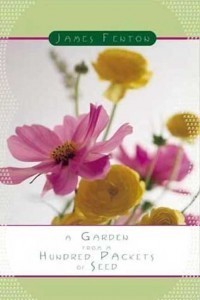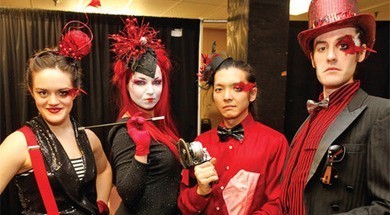The Paris Review's Blog, page 906
June 20, 2012
Dear Don Draper

Sunday. Father’s Day. It was a lovely day, high sixties and sunshine, the last spring wind before summer stills the air and AC units plug windows, dripping dirty water on my sunburnt, hairless head. I was at the King Suite at the hotel 6 Columbus on Fifty-eighth street, a comfortable and accommodating establishment decorated in a 1960s mod style. Zebra-patterned throw pillows and four-hundred-thread-count sheets. A Guy Bourdin print was hanging over my bed. The bathroom mirror was circular, haloed by a curved fluorescent bulb that adds a golden aura to my cheeks and shiny head. The bathroom walls were blue tile. The curtains looked like textile cutouts from old issues of Vogue. The bed was large and soft and sexy. The ceiling high and airy. I was here to channel you, Don, to gauge the world through your big brown eyes. I wanted to feel the tidal pull of a room without a past, a bed whose every morning comes complete with clean, new sheets.
That day, through my window, I could see the Columbus Circle fountain, and Central Park beyond it: fathers and sons, fathers and daughters, fathers and dogs and wives and husbands, all out for postbrunch strolls. Families skipped light-footed in the sunlight, smiling and carrying shopping bags. The fathers had received gifts that morning: new ties, new socks, new oversized grill spatulas. Their bellies were swollen with bacon and Bloody Marys. Their faces flushed rosy. They wore sunglasses and stupid shorts; their shirts were thickly pinstriped, overly pocketed, Hawaiian even; all varieties of dad-dork style. These are the new American men: nonsmokers, light drinkers, carb cutters. Boy did they look happy. It was their day.
And where were you that morning, Don? Last we saw, you’d dressed your wife as a Disney princess, and then abandoned her on set so you could drink up at the bar. Megan was lovely, G-ratedly grinning for the cameras. It made you sick to your stomach, didn’t it, the way she gave up her ideals for a little taste of fame? There was something unabashedly babyish in her joy, like a little girl playing dress up. And you were her jaded daddy. You’re the blunt realist who’s seen the gears that turn the wheels of capitalism. You work those gears, pull the levers, propagate the charade. But to buy into it like Megan did? To hang her star on an ad for Butler shoes?
June 19, 2012
The Timid Investigators: An Homage to Roberto Bolaño

Illustration by Hache Holguin.
Then Maria came in and I said do you want café or café con leche, and then Bebe came in and I said do you want a café con leche or a mescal. Maria said she wanted a mescal with a fat worm and then Bebe said she wanted a clear tequila, then Maria said Verlaine is a better poet than Rimbaud who turned Verlaine from anapest to pederast, then Luiz came in with a kitchen knife and started cutting his dick right in front of us, but when Maria, who came from Xochimilco and whose father was a tram conductor and whose mother had run a small brothel in Taxco before she saw the light of Jesus and married and had Maria and several other Brats as Maria called them, and Maria said stop cutting that huge magnificent dick of yours or at least don’t do it here in the kitchen, and Luiz said he was going to start a magazine and publish only nuns and queers. Fuck you, I said, fuck you, chinga tu madre! Then two guys I didn’t know came in high from pot and giggling like tweens, Maria said hello Paco, hello Paquito. They were the twins from Guadalajara and wrote for a magazine called Anal Retention and they were stars in the poetry world faction that sided with Quevedo against Gongora and said they would stomp anyone who read that pussy Quevedo, but they were frail and I could not imagine their stomping a sleeping cockroach drunk on pulque, then I said, Hey! Twins, you want a café solo or a café con leche or a diet Coke or a zero Coke or maybe a Fanta lite, or maybe an Aztec cola but just then Maria took me by the arm and said come with me, I have to tell you something. And we went to the bedroom where a young woman was sleeping off the night before and Maria said don’t mind her, that’s just Silvina, she’s blind and gives handjobs for five pesos, and an extra five if you come on her face. She must make a lot of money I said. She does, she’s rich and owns property in Pedregal and in Chapingo but nobody knows so don’t tell, anyway I wanted you to know I don’t love you and that I will never sleep with you no matter what you do so don’t write any poems for me because that won’t work the way it did when you fucked my sister, Leche de Amor—I never fucked her I said. Yes you did she said, Carlota el Camino told me and Leche de Amor told her. I saw bright lights flash in the window, then the slam of a car door, then two huge guys the size of shipyards barged in pistols in hand. “Where is that faggot Noche de Azul?” one said, spitting out a plank of a toothpick cut from plywood.
“Where is that Quevedo faggot?” the one with the flat nose said; “We have a little present for him,” the other with a flatter nose said.
“Who’s looking?” I asked.
“The Gongora twins,” they answered with flames.
Abandoned House, Frankfort, Maine
© Corinne Botz. Click to enlarge.
My sister and I always heard our names called. My father always said it was the wind, but the wind don’t say your name. I didn’t like going up on the third floor, that’s where I saw a man sittin’ in an easy chair. Sometimes it sounded like people were walking around the house and running down the halls. When we first moved there the floor in the back room was all cluttered with love letters. Maybe that guy died there or somethin’. That place made me feel so weird. My mother died in the house the day we were moving out; I feel like a part of her is still there. It was always cold in the house so my mother was happy we were moving to a warm place. The moving vans had just left, she was finally gettin’ out of the house and she never got out. As bad as I wanted to leave cause it’s creepy, I miss it. I’m not sure if it’s true but I heard that the man who bought it won’t stay there ’cause it’s haunted. The place has been empty for a long time.
—Cheryl, who lived with her family in the house from the 1950s until the 1970s
Corinne Botz is a Brooklyn based photographer. A solo exhibition of her work opens in July at RedLine Gallery in Denver. She will be exhibiting Haunted Houses in a group exhibition at Museum Morsbroich in Germany this fall. To see more haunted houses or to hear ghost stories, visit the Haunted House project.
You’re at a Justin Bieber Concert

Photograph by Peggy Sirota.
About a year and a half ago—when we were all still riding high on the platinum-certified Justin Bieber of My World 2.0; we didn’t even have the very spirited Christmas album, Under the Mistletoe, yet—I spent a day as a guest educator at an elementary school in Cedar Rapids, Iowa. In my role as underqualified outsider, I oversaw a battery of improv activities I had made up the night before (taught being too strong a word, for I taught those wee lads and lasses nothing, save that pretending to be in a school-bus accident is more fun than learning how to write in cursive). At my command, the Midwestern moppets acted out one fantastical situation after another: they walked through imaginary mansions in a game called “Real Estate Agent,” took turns delivering absurd one-word-at-a-time answers as a guest on my daytime talk show, “Three-Headed Expert.” When the time came for a relatively simple activity that required them to act out situations as I named them (“You’re at the grocery store!” “You’re coming home from school!”), I provided a couple of mundane prompts, and then, unable to control myself any longer, played my ace.
“You’re at a Justin Bieber concert!”
Some of the girls threw themselves on the ground in a shrieking rapture; others ran around the classroom in hysterics, shouting “Justin! I love you, Justin!” One young lady, offended by the suggestion that she ought to join this breathless frenzy, stood unmoving and angry, her arms hanging at her sides. “I hate Justin Bieber!” she whined. Most of the boys were with her, groaning, pretending to vomit, plugging their ears. Of all the scenarios I guided them through that day, the imaginary Justin Bieber concert was the hardest to break up. It took me several minutes to regain their attention.
June 18, 2012
TPR v. The Nation; or, The Evening Redness in Lower Manhattan
Team |1|2|3|4|5|6|7 Total
TPR |0|0|3|0|0|1|0 4
NAT |5|0|0|0|4|0|X 9
Within the first minute the slaughter had become general. —Blood Meridian
Themes found in Cormac McCarthy’s grotesque 1985 masterpiece, Blood Meridian, hereby presented in descending order relative to how closely they can be applied to a postgame dissection of last week’s softball game against The Nation:
1. Destruction, Chaos
Blood Meridian is essentially a chronicle of destruction, a hurricane of terrible things like knives and guns and dead babies. This game, while not a massacre of flesh, was nonetheless a massacre (maybe of the human spirit?). From the onset, our side played a sloppy game; a slew of early errors gave The Nation a first-inning lead they would not relinquish. Like in the novel, the slaughter was complete; unlike in the novel, it was mostly self-inflicted.
Drunk Texts from Famous Authors
Sheila Heti on How Should a Person Be?

Photograph by Sylvia Plachy.
If you’ve been loving Lena Dunham’s Girls, you should most certainly pick up a copy of Sheila Heti’s new novel, How Should a Person Be? In it, fictional Sheila struggles to answer the titular question through conversations with her friends (including Margaux, Misha, and Sholem), blowjobs, impulsive trips to Atlantic City and ... a whole lot more. The novel is a blend of the real and the imaginary—and somehow, in the process of recording her life, real Sheila blends into fictional Sheila, creating a work of metafiction that is playful, funny, wretched, and absolutely true. Sheila and I Gchatted not long ago. Sheila is an impressive writer (see her full bio here) as well as the interviews editor at The Believer. Below is an edited version of our conversation.
Let’s talk about your process. How did you take your conversations from your life and weave it into fiction?
I don’t know. I did lots of different things. But the conversations were not meant for a book. I was just taping friends. I didn’t have a plan for where I was going.
Did you think you were writing your play?
I wasn’t sure. I’d spent the previous five years working on Ticknor, and I wanted to sort of shake that off me. So all the transcribing I was doing was kind of like drinking a glass of water—it was refreshing, like a palate cleanser—a way of getting out of my imagination. Taping and transcribing was part of looking around to see what things were really like in my environment. I’d been completely in my room, in my head, not looking at anything.
That reminds me of something Tilda Swinton once said about filmmaking—it’s a social way of making art. What do you think happens when you’re working like this?
Well, the writing becomes more like life in that you don’t know where you’re going to end up, and you don’t know what’s going to end up being important. It’s like how in life you can meet somebody and not think much of them, then a few years later you’re married and in love, but the person you were really drawn to and thought, This is it!—you forget about them six months later. When I began transcribing, I was certain that I wanted to write a book with no people in it, about the workings of a supermarket.
That sounds so different than the book you ended up writing!
Welcome, Thessaly!
 Here is some exciting news: our founding Web editor and wonderful friend Thessaly La Force, in from Iowa City, is helming the Daily this week! Look forward to her inimitable wit, wisdom, and style over the coming days and make her feel at home!
Here is some exciting news: our founding Web editor and wonderful friend Thessaly La Force, in from Iowa City, is helming the Daily this week! Look forward to her inimitable wit, wisdom, and style over the coming days and make her feel at home!
June 15, 2012
The Paris Review in Vice
For their fiction issue, Vice magazine asked Sadie and me to write the Dos and Don’ts. A dream come true! Except it turns out to be much harder than it looks. Eventually Sadie connected with her inner mean kid … but some of us just will never be arbiters of cute, and I’m learning to accept that.
What We’re Loving: Gardens, Riches, and Kidneys
 The classical novel exists, in large part, to teach us how to imagine money—the more than we’ll ever have, the more than we’ll ever lose. Nobody today writes more convincingly about lucre than Jonathan Dee. You glance up from The Privileges thinking, Sure, I can imagine how it would feel to be that level of mega-filthy, godalmighty rich—it’s like grasping some exotic theorem—then you dive back in to watch the Moreys make even more. (For a round-up of moneycentric novels, check out Christian Lorentzen in the new Bookforum.) —Lorin Stein
The classical novel exists, in large part, to teach us how to imagine money—the more than we’ll ever have, the more than we’ll ever lose. Nobody today writes more convincingly about lucre than Jonathan Dee. You glance up from The Privileges thinking, Sure, I can imagine how it would feel to be that level of mega-filthy, godalmighty rich—it’s like grasping some exotic theorem—then you dive back in to watch the Moreys make even more. (For a round-up of moneycentric novels, check out Christian Lorentzen in the new Bookforum.) —Lorin Stein
I’m not a gardener—I can hardly tell tulips from forget-me-nots—but I have many friends who are, and I’ve just come across the perfect book for them. James Fenton’s A Garden from a Hundred Packets of Seed is short, witty, and useful. If you were starting a flower garden from scratch, Fenton asks, what flowers would you choose to grow in it? The names themselves are a pleasure to read: the Shoo-Fly Plant (also known as the Apple of Peru), the Pheasant’s Eye, the Iceland Poppy, the Blue Pygmy. Fenton also gives sound advice: “When handling seedlings, always hold them by the leaves, not by the stem”; and, “Forcefully remind your cat about the difference between seed trays and litter boxes.” —Robyn Creswell
The Paris Review's Blog
- The Paris Review's profile
- 305 followers






